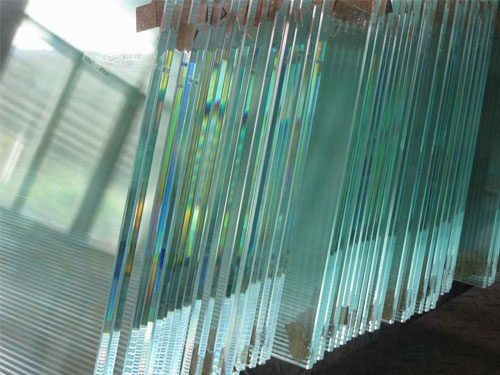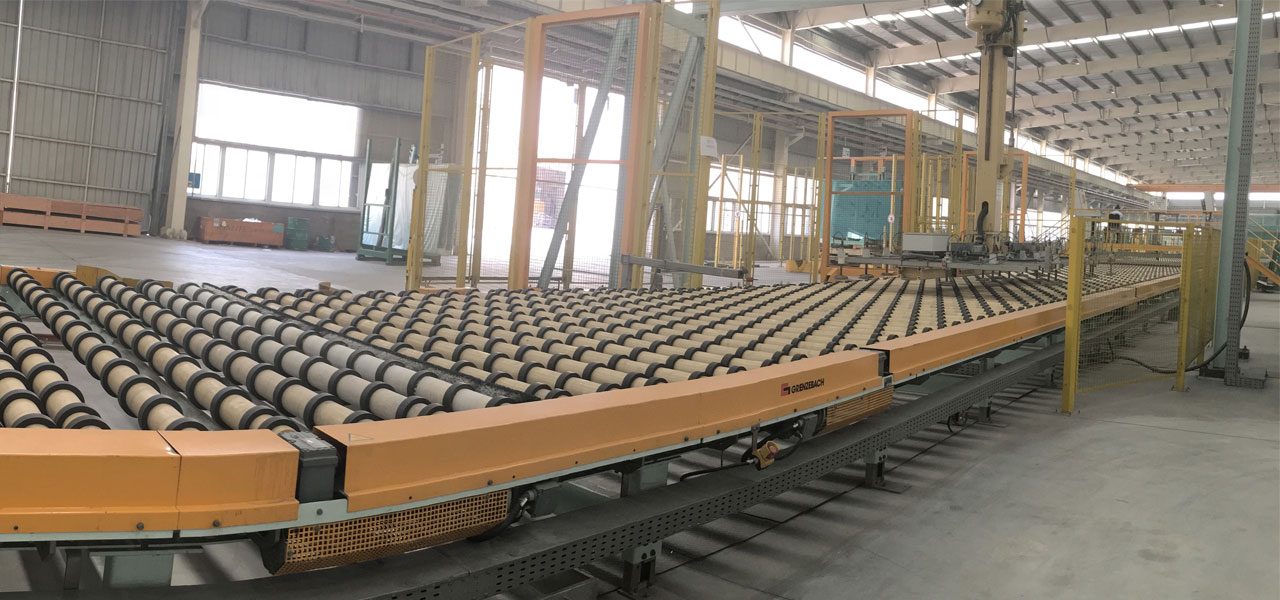Float Process:
Melting and refining - Float bath - Annealing - Inspection - Cutting to order
Features:
• Reduced distortion levels over time, smooth surface with no ripple ;
• Improved internal quality, reduced self-explode rate;
• Optical quality degrades with reduced thickness;
• Optical quality degrades with increased throughput;
• Product standards are generally independent of thickness;
Thickness Range
2mm-19mm
Width Range
1460mm - 3660mm

Manufacture
Float glass uses common glass-making raw materials, typically consisting of sand, soda ash (sodium carbonate), dolomite, limestone, and salt cake (sodium sulfate) etc. Other materials may be used as colourants, refining agents or to adjust the physical and chemical properties of the glass. The raw materials are mixed in a batch process, then fed together with suitable cullet (waste glass), in a controlled ratio, into a furnace where it is heated to approximately 1500 °C. Common flat glass furnaces are 9 m wide, 45 m long, and contain more than 1200 tons of glass. Once molten, the temperature of the glass is stabilised to approximately 1200 °C to ensure a homogeneous specific gravity.
The molten glass is fed into a "tin bath", a bath of molten tin (about 3–4 m wide, 50 m long, 6 cm deep), from a delivery canal and is poured into the tin bath by a ceramic lip known as the spout lip. The amount of glass allowed to pour onto the molten tin is controlled by a gate called a tweel.
Tin is suitable for the float glass process because it has a high specific gravity, is cohesive, and is immiscible with molten glass. Tin, however, oxidises in a natural atmosphere to form tin dioxide (SnO2). Known in the production process as dross, the tin dioxide adheres to the glass. To prevent oxidation, the tin bath is provided with a positive pressure protective atmosphere of nitrogen and hydrogen.
The glass flows onto the tin surface forming a floating ribbon with perfectly smooth surfaces on both sides and of even thickness. As the glass flows along the tin bath, the temperature is gradually reduced from 1100 °C until at approximately 600 °C the sheet can be lifted from the tin onto rollers. The glass ribbon is pulled off the bath by rollers at a controlled speed. Variation in the flow speed and roller speed enables glass sheets of varying thickness to be formed. Top rollers positioned above the molten tin may be used to control both the thickness and the width of the glass ribbon.
Once off the bath, the glass sheet passes through a lehr kiln for approximately 100 m, where it is cooled gradually so that it anneals without strain and does not crack from the temperature change. On exiting the "cold end" of the kiln, the glass is cut by machines.

APPLICATIONS
• Picture framing
• Architectural interiors
• Facades
• Shop fronts
• Museums
• Panoramic restaurants
• Showrooms
• Luxury commercial decoration
• Stadiums/arenas
• Historical preservation
• Waiting rooms
• Display windows
• Design elements
• Partition walls
• Artwork
• Cash dispensers
• Petrol stations
• Display cases
• Balustrades
• Store fixtures
• Lobbies
• Foyers
• TV and recording studios
• Observation rooms
• Display units
• Internal partitions
• Interpreter / sound booths
• Zoos and aquariums
• Terrariums and vivariums
• Airports
• Control towers
• Bulletproof windows
| Product Name | Ultraviolet transmittance | Visible light transmittance | Visible reflectivity | Solar Energy Transmittance | Solar Energy reflectivity | Total solar energy transmittance |
| (2.1clear) | 76.26 | 90.63 | 7.45 | 87.55 | 7.1 | 88.93 |
| (3.0clear) | 75.57 | 90.53 | 7.26 | 87.2 | 6.94 | 88.71 |
| (4.0clear) | 71.43 | 90.17 | 7.5 | 85.46 | 7.03 | 87.4 |
| (5.0clear) | 67.89 | 89.83 | 7.05 | 83.96 | 6.55 | 86.41 |
| (6.0clear) | 65.68 | 89.34 | 7.36 | 82.73 | 6.76 | 85.44 |
| (8.0clear) | 60.14 | 88.64 | 7.11 | 79.66 | 6.39 | 83.26 |
| (10.0clear) | 56.19 | 87.52 | 7.09 | 76.67 | 6.18 | 80.35 |
| (12.0clear) | 55.04 | 87.27 | 6.73 | 75.06 | 5.88 | 79.98 |
| (15.0clear) | 51.59 | 86.3 | 7.58 | 71.81 | 6.42 | 77.43 |
| (19.0clear) | 47.91 | 84.99 | 7.12 | 67.93 | 6.13 | 74.21 |
| (22.0clear) | 45.23 | 83.25 | 6.89 | 65.21 | 6.05 | 73.86 |
About Jingglass Located in famous “world factory" Dongguan city, Jingglass is a import and export business, which intergrates glass manufacturer and trader. Jingglass mainly serve for window & door businesses, curtain wall firms, real estate developers and so on. We focus on customers' demands, provide the most cost effective glass solution…
Office Addr:Room 1107, B1 Block, Tianan Cyber,Nancheng Area, Dongguan City, Guangdong Province, China,
Factory Addr:Taiying Industrial, Hongmei Town, Dongguan City, Guangdong Province, China
86-769-22273585
86-18145870793
![]()